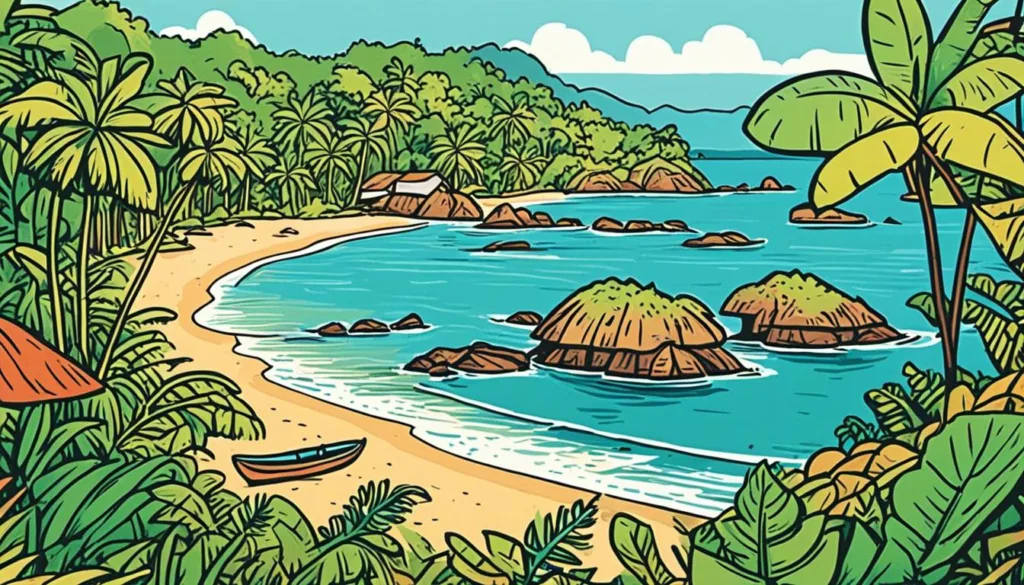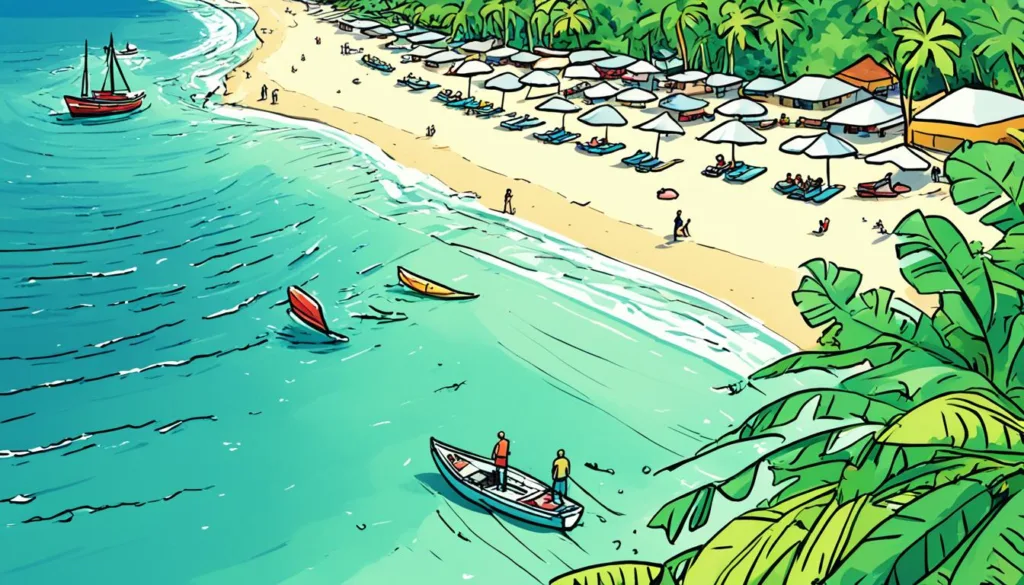As wanderlust grips your soul and the allure of West Africa calls, have you ever pondered the Best Time to Visit Liberia? Liberia, a hidden gem nestled on the coast, offers travelers an unspoiled glimpse into natural splendor and a robust historical tapestry. Yet timing is everything. By synchronizing your Liberia vacation timing with the country’s climatic rhythm, you can forge unforgettable memories under the radiant Liberian sun or amidst the enchanting tropical monsoons.
Understanding the Liberia travel season can transform an ordinary getaway into an extraordinary journey of discovery. From pristine beaches to the echoes of rich traditions, identifying the season that resonates with your travel aspirations is key. And with a few savvy Liberia tourism tips, your adventure can be as seamless as it is thrilling. As we divulge Liberia’s seasonal secrets, ask yourself – when do you wish the Liberian horizon to unfurl before you?
Key Takeaways
- Timing your trip during Liberia’s dry season means sunnier skies and easier travel.
- Avoid the dusty harmattan winds by planning around the December to February window.
- Postpone your inland excursions if you can’t handle the heat of March and April.
- Prefer serene travel? May to October’s rainy season offers fewer tourists and lush landscapes.
- For cultural events, align your visit with significant Liberian dates for a richer experience.
- Remember, each season offers unique opportunities to explore Liberia’s coastlines, history, and culture.
Understanding Liberia’s Climate for Travel
Embarking on a Liberia trip planning adventure is an exciting endeavor, but it’s crucial to understand the climate nuances for an optimal travel experience. Knowing the Liberia weather guide can help determine the best itinerary and when to go to Liberia. Below, we’ll delve into the annual weather trends and the unique differences between coastal and inland temperatures, with special attention to the harmattan season.
Liberia Weather Trends Throughout the Year
Liberia offers a dynamic weather pattern, shaping the local ecosystem and travel conditions throughout the year. The alternation between dry and wet seasons significantly impacts transportation and activities. During the rainy season, from May to October, expect heavy showers leading to lush landscapes but also to muddy roads challenging travel logistics. Conversely, the dry season spanning November to April provides sunny days, clear skies, and more manageable travel conditions.
Exploring the Coastal Versus Inland Temperature Variations
Temperature gradients in Liberia can be quite pronounced depending on your location. The coastal regions of Liberia are cooled by sea breezes, maintaining temperatures between 23°C to 32°C. Traveling inland, temperatures tend to be higher, which might influence your packing list and daily planning. Understanding these variations is essential for a comfortable trip, whether you’re lounging on the beaches or exploring the vibrant inland culture and landscapes.
Dealing with the Harmattan: Liberia’s Dusty Season
The harmattan season, typically affecting the region from December through early February, deserves special mention in any Liberia weather guide. This period is marked by dusty winds that blow from the Sahara, reducing visibility and air quality. While this phenomenon is a remarkable natural occurrence, it can also be challenging for travelers. Hence, planning your Liberia visit for either November or by mid-February is advisable to avoid the brunt of this season.
| Month | Weather Condition | Travel Recommendation |
|---|---|---|
| November – April | Dry Season | Ideal for travel; clear roads, fewer mosquitoes |
| May – October | Rainy Season | Possible road challenges; lush landscapes |
| December – Early February | Harmattan | Reduced visibility; consider travel outside these months |
Liberia’s Cultural and Natural Wonder Calendar
Strategizing your Liberia trip planning encompasses not just identifying the perfect Liberia travel season but also aligning your visit to experience the nation’s vibrant cultural events and natural attractions. Below are some essential tips and highlights for travelers looking to immerse themselves in the authenticity of Liberian culture and the raw beauty of its landscapes.

Liberia’s heritage as a former haven for freed American slaves is palpable through its monuments and historic sites, such as the National Museum which showcases the diverse ethnicities that form Liberia’s social fabric. The untouched beaches also offer sanctuary to both the soul searcher and the adventure enthusiast, with places like Cape Mount providing quintessential surfing opportunities.
- Cape Mount’s waves beckon surfers from around the globe.
- Chimpanzee Island provides a safe haven for rescued primates and is a touching testament to conservation efforts in West Africa.
- The sacred Kpatawee Waterfall, nestled in the heart of the country, invites travelers seeking tranquility and reflection.
Woven into the tapestry of Liberia’s breathtaking topography is its delectable cuisine. A must-try is the spicy palm butter soup paired with fufu—a staple that combines taste with tradition, alongside an array of seafood options, including fresh crawfish.
| Date | Event | Description | Location |
|---|---|---|---|
| March 15th | Joseph Jenkins Roberts’ Birthday | Celebration of Liberia’s first president’s birthday, reflecting the nation’s journey towards independence. | Nationwide |
| May 14th | National Unification Day | A day dedicated to promoting unity and peace among Liberia’s diverse ethnic communities. | Nationwide |
Whether you’re a history buff, a culinary enthusiast, or a nature lover, planning your Liberia itinerary around these cultural pillars and natural marvels will ensure a trip entrenched in rich experiences. For an elaborate Liberia tourism tips list or recommendations on maximising your travel throughout various seasons, consider the highlighted events that exemplify the country’s spirit and the vibrant life that pulses through its streets and wilds.
Best Time to Visit Liberia: Seasonal Highlights
When considering the peak season in Liberia for tourism, it’s pivotal to focus on when the nation unveils its most inviting features. Whether it’s the vibrant local culture or the dazzling array of natural landscapes, understanding Liberia vacation timing is key to planning a memorable trip.
Navigating Liberia During the Dry Season
The period from December to April marks the dry season in this West African gem, setting the stage for smooth travels and uninterrupted adventures. Liberian roads and byways become more passable, freeing you to explore the nation’s storied towns and breathtaking backdrops without the hindrance of rains.
Enjoying Liberia’s Beaches and Surf Spots
Liberia is celebrated for its stunning, uncluttered coastlines, with local and international surfers championing places like Robertsport for their impressive swells. In these months, the sunlit sands and welcoming tides beckon beachgoers to relax and revel in the serene atmosphere.
Wildlife Observations: Ideal Months for Nature Lovers
The dry season’s sparse precipitation brings wildlife closer to accessible water sources, providing exceptional opportunities for observation. Rare creatures, including the elusive pygmy hippo, are drawn out into view, particularly in lush locales like Sapo National Park – a must-visit for any wildlife enthusiast.
Off-Peak Liberia: Travel Tips and Advantages
While many travelers flock to Liberia during the dry season, there’s a unique charm to visiting during the off-peak Liberia travel months. Despite the high humidity and rainfall from May to November, a Liberia vacation during this time promises fewer tourists and an atmosphere distinct from the peak travel season.
Embracing Liberia’s Rainy Season Travel
Traveling to Liberia during the rainy season is an exercise in adventure and adaptability. With the right preparations, such as waterproof gear and flexible itineraries, you can witness the extraordinary beauty of the rainforests and the vibrant wildlife that flourishes during this time. The rainy season is characterized by the lush greenery of Liberia’s landscapes, a truly enchanting sight for any traveler.
Experiencing Local Life Without the Crowds
Visiting Liberia when it’s not the peak tourist season provides an unparalleled opportunity to engage with the local culture. You’ll find markets less crowded and beaches more serene, allowing for genuine interactions and a deeper understanding of the Liberian way of life. This can be the ideal time for cultural immersion, as community life continues richly and authentically during the wetter months.
Cost Savings for the Smart Traveler
Timing your vacation outside of the typical Liberia travel season can lead to serious savings. From discounted accommodations to more affordable tours, smart travelers can take advantage of the financial benefits that come with off-peak travel. The lessened demand can often result in lower prices and better deals for visitors.

- Prepare for weather: high humidity and regular downpours
- Experience richer interactions with local communities
- Enjoy the vibrant scenes of nature in full bloom
- Take advantage of potential discounts on travel expenses
Whether you’re trekking through the verdant jungles or exploring the historic sites, off-peak Liberia travel offers a host of benefits for those looking to experience something different from the usual tourist path. By visiting during the Liberia rainy season, you equip yourself for a journey filled with discovery, value, and the essence of Liberia’s natural and cultural splendor.
Conclusion
Embarking on a journey to Liberia presents an array of seasonal delights, each offering a distinct perspective on this vibrant West African nation. For those mapping out their Liberia travel season, it’s evident that the dry months pave the way for not just seamless travel but also for basking in the coastal sunshine, diving into the cultural festivities, and exploring the golden beaches at leisure. The clear skies of the dry season complement the traveler’s thirst for adventure and exploration, making it a highly recommended time for Liberia trip planning.
Yet, the allure of the rainy season cannot be overlooked. It beckons the intrepid explorers who wish to uncover the daily rhythms of local life, the rejuvenating greenery, and the thriving wildlife, all while tapping into possible economic benefits. This period challenges the notion of discomfort, instead rewarding those equipped with curiosity and the right travel gear with a more budget-friendly experience and fewer crowds. It’s a reminder that determining when to go to Liberia speaks more to personal preference and the particular richness one hopes to glean from their journey.
Whether you aspire to lounge on sunlit shores or delve into the verdant hinterlands during the off-peak months, Liberia’s contrasting seasons cater to a diverse set of travel appetites. Reflect on what lie at the heart of your wanderlust as you decide on the optimal time to make your way to this land of unspoiled charm and resilient spirit. Whatever the choice, the promise of discovery and the warmth of Liberia await.






